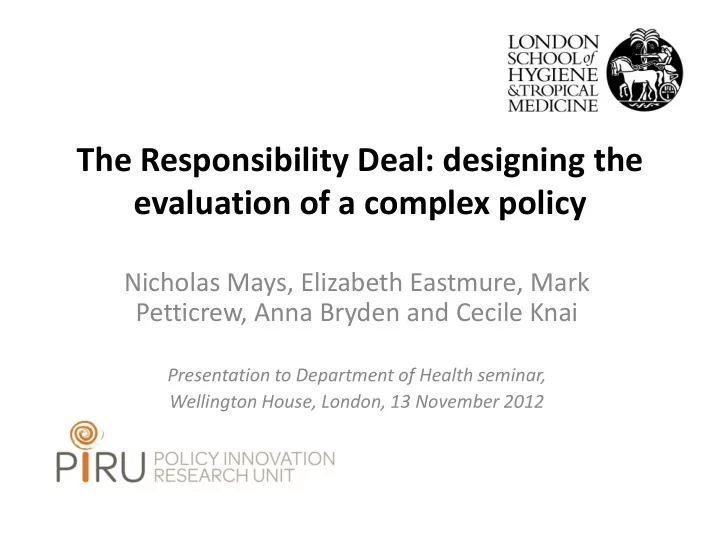

The Responsibility Deal: designing the evaluation of a complex policy Nicholas Mays, Elizabeth Eastmure, Mark Petticrew, Anna Bryden and Cecile Knai Presentation to Department of Health seminar, Wellington House, London, 13 November 2012
What is the Public Health Responsibility Deal? • A public private partnership organised around voluntary agreements that aims to bring together government, academic experts and commercial and voluntary organisations to contribute to meeting public health objectives • Businesses commit to voluntary pledges to undertake actions for a public health benefit (in food, alcohol, physical activity, health at work and behaviour change) • Andrew Lansley stated that ‘by working in partnership, public health, commercial and voluntary organisations can agree practical actions to secure more progress, more quickly, with less cost than legislation ’
Food collective pledges F1. We will provide calorie information for food and non alcoholic drink for our customers in out of home settings from 1 September 2011 in accordance with the principles for calorie labelling agreed by the Responsibility Deal. F2. We commit to the salt targets for the end of 2012 agreed by the Responsibility Deal, which collectively will deliver a further 15% reduction on 2010 targets. For some products this will require acceptable technical solutions which we are working to achieve. These targets will give a total salt reduction of nearly 1g per person per day compared to 2007 levels in food. F3. We have already removed, or will remove, artificial trans fats from our products by the end of 2011. Individual Food Pledges FI – 1. The Association of Convenience Stores (ACS) has committed to work with its members to roll out Change4Life (C4L) branding into 1000 stores, learning from the successful ACS/DH programme to improve fruit and vegetable availability in deprived areas.
Challenges of evaluation Does the RD work? • This is not a simple question • There are (at least) two levels at which the RD operates, and at which this question can be addressed: 1. Does the RD as a mechanism “work”? 2. Do the pledges that it brings about “work”?
e.g. “We will provide calorie information for food and non alcoholic drink for our customers in out of home settings from 1 September 2011 in accordance with the principles for calorie labelling agreed by the Responsibility Deal”. Compliance Knowledge/attitudes/understanding Behaviour Of the list of Is the labelling Does it change What is overall companies that clear, visible, behaviour impact on diet? * signed up, what have readable, (purchasing; they done? comprehensible? consumption) e.g. qualitative Monitoring data e.g. Small scale e.g. Small scale research; survey; qualitative qualitative existing data research; survey research; survey; routine data * Though the actual “impact” on diet will be difficult to prove
Q1. Does the RD as a mechanism “work”? Can be assessed against two key outcomes: (i) Has it “brought together a partnership between government, academic experts, and commercial and voluntary organisations to contribute to meeting public health objectives?” (ii) Has that process resulted in meaningful (evaluable) pledges?
Q2: Do the pledges themselves “work”? • Generally interpreted in terms of improving health • But the timescales for health impacts resulting from specific pledges vary widely, and for some impacts may be impossible to ascertain – this is the nature of public health interventions
Phase 1: methods, Nov 2011-March 2012 • Scoping review to identify evidence from previous studies of voluntary agreements between governments or government bodies and industry or industry groups, within any sector (transparent sign up process detailling specific actions or outcomes) • Assessment of the evaluability of pledges against SMART criteria • Development of a logic model, informed by interviews and the scoping review, to detail assumptions about causal pathways and the mechanisms of individual pledges, and to add clarity and structure to discussions about the evaluation and effectiveness of the RD
Findings of scoping review • 47 studies, mostly outside of the health sector • Voluntary agreements may help to improve relationships between government and business, and can help agree targets and data sharing • The most effective voluntary agreements have substantial disincentives for non-participation and costly sanctions for non-compliance, and robust independent monitoring • Little evidence on whether voluntary agreements are more effective than compulsion • Barriers include: cost to business, lack of incentives or recognition, lack of clear targets
Evaluability of pledges
Logic model • Informed by discussions, interviews, analysis of pledges, the scoping review • Provides a conceptualisation (‘theory’) of what the RD is, how it is expected to ‘work’ and what its outcomes might be • Helps in identifying the evaluation questions and key data that would need to be collected • Expect that the logic model will be updated as we learn more about how the RD functions
Conclusions from Phase 1 • The RD has generated industry participation and engagement • Easy to demand evaluation of the RD, far harder to work out what can be evaluated and how – e.g. few of the pledges are amenable to impact evaluation as currently specified – causal pathways are long and over time
A comprehensive evaluation... • Would operate at multiple levels – RD – Networks – Pledges • and proceed in steps 1. Understand the process (interacting components) 2. Assess penetration (coverage) 3. Assess compliance 4. Determine proximal and intermediate impacts of pledges 5. Evaluate impacts of pledges on (final, health) outcomes
Recommend
More recommend